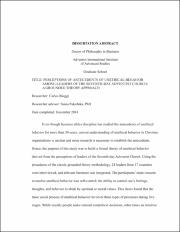| dc.description.abstract | Even though business ethics discipline has studied the antecedents of unethical behavior for more than 30 years, current understanding of unethical behavior in Christian organizations is unclear and more research is necessary to establish the antecedents. Hence, the purpose of this study was to build a forma theory of unethical behavior derived from the perceptions of leaders of the Seventh-day Adventist Church. Using the procedures of the classic grounded theory methodology, 24 leaders from 17 countries were interviewed, and relevant literature was integrated. The participants’' main concern to resolve unethical behavior was self-control; the ability to control one's feelings, thoughts, and behavior to abide by spiritual or moral values. This thesis found that the basic social process of unethical behavior involves three types of processes during five stages. While usually people make rational (un)ethical decisions, other times an intuitive process is activated, and still other times people misbehave unintentionally. The five stages are boundary-defined, boundary-challenged, boundary-loosened, new boundary, and boundary-confronted zones. Self-control plays the critical roles of helping individuals (a) define appropriate and inappropriate ethical boundaries; (b) resist temptations; ad (c) repent, confess, and restore after misbehaving. In addition, this thesis proposes that during each phase of the misbehavior process, predisposition to misbehave is formed by the interaction between pressures, opportunities, and rationalizations (rational process) or intuitions (intuitive process) or amoral thinking (unintentional process). However, self-control moderates the influence of predisposition factors on a decision point by (d) neutralizing pressures, (e) bypassing opportunities, and (f) enabling healthy rationalizations of intuitions. This new theory offers a framework for creating contextualized actions to prevent misbehavior at the individual and organizational levels, as well as a model with suggested actions. In addition, this theory offers a fresh way to organize the ethical decision-making literature in the three types of processes. | en_US |

